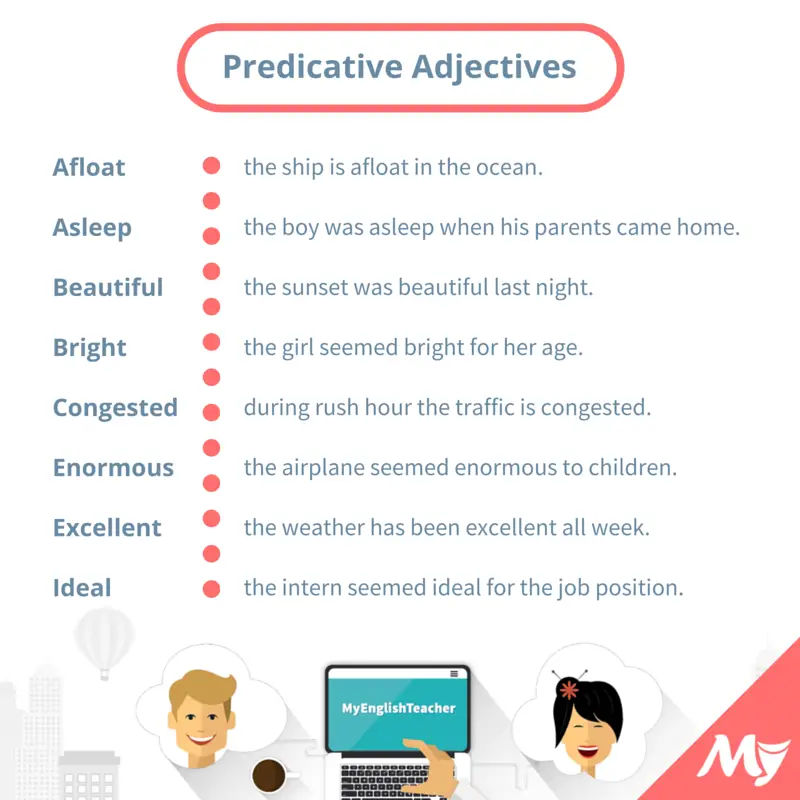What are Predicative Adjectives?
Where do they go in a sentence?
What is the difference between Predicative Adjectives and Attributive Adjectives?

Predicative adjectives give extra information to a sentence by describing or modifying the subject(s) of a sentence. The predicative adjective must be connected to the subject with a “linking verb” or a verb phrase.
For example:
- “they seem scared of the movie” “scared” is the adjective and “seem” is the linking verb.
- “The children have been asleep for hours” “asleep” is the adjective and “have been” is the verb phrase.
Predicative adjectives differ from attributive adjectives as attributive adjectives come before a noun and predicative adjectives are placed after a linking verb.
Below I have listed examples that contain predicative adjectives. While reading the examples, look out for the linking verb and where it is placed in the sentence.
- Afloat – the ship is afloat in the ocean.
- Asleep – the boy was asleep when his parents came home.
- Beautiful – the sunset was beautiful last night.
- Bright – the girl seemed bright for her age.
- Congested – during rush hour the traffic is congested.
- Dark – the house was dark inside.
- Disappointed – the students felt disappointed with their exam results.
- Enormous – the airplane seemed enormous to children.
- Excellent – the weather has been excellent all week.
- Excited – the dog felt excited for his morning walk.
- Extravagant – her wedding dress was extravagant.
- Forlorn – she seemed forlorn.
- Funny – the sitcom can be funny.
- Great – the dinner smelled great.
- Happy – the football team were happy when they won the match.
- Healthy – you can be healthy if you want to be.
- Hopeful – the police became hopeful when they discovered new evidence at the crime scene.
- Ideal – the intern seemed ideal for the job position.
- Intelligent – a doctor must be intelligent.
- Japanese – the restaurant is Japanese.
- Jolly – they became jolly during the celebrations.
- Kind – the teacher was kind to her students.
- King-size – they ordered a king-size bed.
- Lazy – teenagers can be lazy.
- Lively – the birthday party was lively.
- Lucrative – the investment became lucrative.
- Mature – he is mature.
- Miserable – the fans were miserable when the lost the final.
- Muddy – the rugby pitch became muddy during the heavy rainfall.
- Naughty – children can be naughty at times.
- Noisy – their neighbours become noisy when they host parties.
- Odd – they thought the play was odd and wouldn’t recommend it to their friends.
- Oily – a chain on a bike is oily.
- Painless – the operation should be painless.
- Paranoid – he can be paranoid at times.
- Powerful – the political speech was powerful and grabbed the audience’s attention.
- Qualified – all of our mechanics are qualified.
- Ravishing – the bride looked ravishing on her wedding day.
- Reckless – his driving can be reckless.
- Soft – some mattresses are soft, others are hard.
- Sweet and sour – the melon tasted sweet whereas the lime tasted sour.
- Terrific – it has been a terrific holiday!
- Tidy – his car appears tidy until you look at the back seats.
- Unbiased – a judge must be unbiased.
- Understanding – her parents have always been understanding.
- Ungrateful – she seems ungrateful.
- Vain – models can be vain sometimes.
- Vindictive – the criminal is vindictive, he wants revenge.
- Waterproof – hiking gear should be waterproof.
- Warm – the sun felt warm on their skin.
- Xenophobic – a person who is afraid of or hates anything foreign is xenophobic.
- Yellow – the yolk of an egg is yellow.
- Young – the students in this class are young.
- Zesty – lemons taste zesty.
Predicative adjectives can be used more than once in a sentence, for example:
- The play was impressive and though-provoking.
- The Irish flag is green, white and orange.
- Gabriel seemed friendly and confident.
- Backpacking can be exciting and amazing.
- The lamb stew was delicious and comforting.
- The apartment was furnished, well-located and affordable.
As you can see from the examples above, there are many adjectives that can be used as a predicative adjective but they can also be used as an attributive adjective, it depends on where they are placed in the sentence.
Normally, a predicative adjective is placed after a linking verb or verb phrase whereas a attributive adjective is positioned before the noun in the sentence.
For example:
- It is a difficult exam. (attributive adjective)
- The exam is difficult. (predicative adjective)
- He is a sad man. (attributive adjective)
- He is sad. (predicative adjective)
Recommended for you:
When to use ADVERBS and ADJECTIVES?
How to Teach English Adjectives So That Your Student Will ..
Order of Adjectives: Explanation + Exercises
List of Commonly Used Participial Adjectives


























